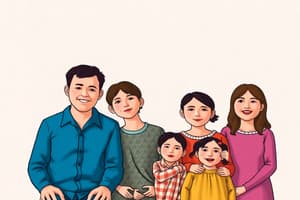Podcast
Questions and Answers
What is a nuclear family?
What is a nuclear family?
- A family with multiple generations living together
- A family consisting of parents and their siblings
- A couple and their dependent children (correct)
- A single parent family
What is an extended family?
What is an extended family?
- A family that does not include children
- A family consisting of only one parent and children
- A family with only parents and children
- A nuclear family with additional relatives living together (correct)
What defines a classic extended family?
What defines a classic extended family?
When three or more generations live together in one household.
What is a modified extended family?
What is a modified extended family?
What characterizes a beanpole family?
What characterizes a beanpole family?
What is a patriarchal family?
What is a patriarchal family?
What defines a matriarchal family?
What defines a matriarchal family?
What is a symmetrical family?
What is a symmetrical family?
What is a reconstituted family?
What is a reconstituted family?
What is a lone parent family?
What is a lone parent family?
What defines a gay/lesbian family?
What defines a gay/lesbian family?
What is a single person household?
What is a single person household?
What is the functionalist perspective on family?
What is the functionalist perspective on family?
What is the feminist perspective on family?
What is the feminist perspective on family?
What does the New Right perspective believe about family?
What does the New Right perspective believe about family?
What do Marxists believe about the family?
What do Marxists believe about the family?
What is the postmodernist perspective on family?
What is the postmodernist perspective on family?
What are some reasons for increased diversity in family structures?
What are some reasons for increased diversity in family structures?
What is age patriarchy?
What is age patriarchy?
What is the birth rate?
What is the birth rate?
Flashcards
Nuclear family
Nuclear family
A couple and their dependent children forming a core social unit.
Extended family
Extended family
Includes the nuclear family plus additional relatives like grandparents, aunts, uncles, and cousins, often living together.
Classic extended family
Classic extended family
Three or more generations residing in one household.
Modified extended family
Modified extended family
Signup and view all the flashcards
Beanpole family
Beanpole family
Signup and view all the flashcards
Patriarchal family
Patriarchal family
Signup and view all the flashcards
Matriarchal family
Matriarchal family
Signup and view all the flashcards
Symmetrical family
Symmetrical family
Signup and view all the flashcards
Reconstituted family
Reconstituted family
Signup and view all the flashcards
Lone parent family
Lone parent family
Signup and view all the flashcards
Gay/lesbian family
Gay/lesbian family
Signup and view all the flashcards
Functionalist Perspective
Functionalist Perspective
Signup and view all the flashcards
Feminist Perspective
Feminist Perspective
Signup and view all the flashcards
New Right Perspective
New Right Perspective
Signup and view all the flashcards
Marxist Perspective
Marxist Perspective
Signup and view all the flashcards
Postmodernist Perspective
Postmodernist Perspective
Signup and view all the flashcards
Secularisation
Secularisation
Signup and view all the flashcards
Legal changes
Legal changes
Signup and view all the flashcards
Greater gender equality
Greater gender equality
Signup and view all the flashcards
Age patriarchy
Age patriarchy
Signup and view all the flashcards
Study Notes
Family Types
- Nuclear family: Comprised of a couple and their dependent children, functioning as a core social unit.
- Extended family: Includes the nuclear family plus additional relatives such as grandparents, aunts, uncles, and cousins, often living together.
- Classic extended family: Involves three or more generations residing in one household.
- Modified extended family: Members live apart but maintain contact through various communication methods like phone or video calls.
- Beanpole family: Characterized by multiple generations with minimal members in each generation.
- Patriarchal family: Authority is held by the eldest male, typically the father.
- Matriarchal family: Authority is held by the eldest female, typically the mother.
- Symmetrical family: Partners share authority and domestic responsibilities equally.
- Reconstituted family: Formed through the blending of families from previous relationships, often after divorce or separation.
- Lone parent family: A single parent raising dependent children.
- Gay/lesbian family: A same-sex couple raising dependent children.
- Single person household: An individual living independently.
Theoretical Perspectives on Families
- Functionalist Perspective: Views the family as essential for social stability, fulfilling functions that promote social cohesion.
- Feminist Perspective: Considers the family as a mechanism for female oppression, primarily serving men's needs.
- New Right Perspective: Stresses the importance of stable families with married parents, attributing social issues to the decline of traditional family structures.
- Marxist Perspective: Argues that the family supports capitalism and helps individuals cope with its challenges.
- Postmodernist Perspective: Emphasizes societal diversity and rapid change, indicating no single dominant family type exists anymore.
Factors Influencing Family Diversity
- Secularisation: Decline in religious influence has led to more alternative views on marriage and reduced stigma around divorce.
- Legal changes: Easier access to divorce has influenced family structures.
- Greater gender equality: The shift toward gender equality has contributed to the evolution of family types, as noted by Anthony Giddens.
Additional Concepts
- Age patriarchy: Refers to the dominance and control that adults exercise over children.
- Birth Rate: Quantifies the number of live births per thousand population annually.
Studying That Suits You
Use AI to generate personalized quizzes and flashcards to suit your learning preferences.



